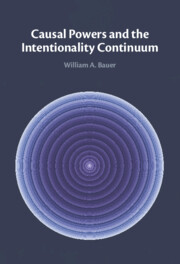Book contents
- Causal Powers and the Intentionality Continuum
- Causal Powers and the Intentionality Continuum
- Copyright page
- Dedication
- Contents
- Figures
- Preface
- Acknowledgments
- Abbreviations
- Introduction
- Part I Why Powers?
- Part II What Are Powers Like?
- Chapter 3 Powers from the Inside
- Chapter 4 A Defense of Physical Intentionality
- Chapter 5 A Defense of Physical Intentionality
- Chapter 6 Powers from the Inside
- Chapter 7 Powers from the Outside
- Chapter 8 Nature’s Intentionality Continuum
- Works Cited
- Index
Chapter 3 - Powers from the Inside
Physical Intentionality
from Part II - What Are Powers Like?
Published online by Cambridge University Press: 13 October 2022
- Causal Powers and the Intentionality Continuum
- Causal Powers and the Intentionality Continuum
- Copyright page
- Dedication
- Contents
- Figures
- Preface
- Acknowledgments
- Abbreviations
- Introduction
- Part I Why Powers?
- Part II What Are Powers Like?
- Chapter 3 Powers from the Inside
- Chapter 4 A Defense of Physical Intentionality
- Chapter 5 A Defense of Physical Intentionality
- Chapter 6 Powers from the Inside
- Chapter 7 Powers from the Outside
- Chapter 8 Nature’s Intentionality Continuum
- Works Cited
- Index
Summary
This chapter begins defending the 3d account of powers, which combines directedness (i.e., intentionality) and data (i.e., information) as essential ingredients of dispositions (i.e., powers). The first thesis in the 3d account is the Physical Intentionality Thesis, and it is introduced here. Two supporting arguments for this thesis are previewed: the Argument from the Marks of intentionality (to be elaborated in Chapters 4 and 5) and the Argument from the Unity of Nature (to be elaborated in Chapter 8). Then historical precursors to physical intentionality are discussed, including Brentano’s thesis, the primary model for the Physical Intentionality Thesis. Lastly, an epistemic (versus a metaphysical) interpretation of physical intentionality is critiqued, a teleological view of powers is compared to the Physical Intentionality Thesis, and other related views are explored.
Keywords
Information
- Type
- Chapter
- Information
- Causal Powers and the Intentionality Continuum , pp. 77 - 90Publisher: Cambridge University PressPrint publication year: 2022
